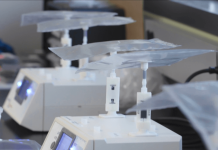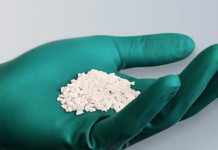The committee voted 22-0 on the question of whether the benefits of Johnson & Johnson’s Covid-19 vaccine outweigh its risks. FDA emergency use authorization would bring the public a third vaccine for the novel coronavirus.
The U.S. is one step closer to making available another Covid-19 vaccine after a panel of experts voted unanimously Friday to recommend emergency use authorization for a shot developed by Johnson & Johnson.

The independent panel, comprised of mostly physicians, voted 22-0 to support the vaccine with no one abstaining. These votes aren’t binding on the FDA, but the agency often follows the recommendations of its panels. A decision could come as early as this weekend. The two Covid vaccines currently cleared for emergency use received their authorizations the day after their respective advisory panel meetings.
The Johnson & Johnson vaccine would offer an alternative to the ones currently available from the Pfizer and BioNtech alliance, and Moderna. Those messenger RNA vaccines must be distributed and stored at ultra-cold temperatures, then thawed before use. Those shots are given as two doses, weeks apart. The J&J vaccine can be kept at refrigerator temperatures. Another key difference is that the J&J jab requires a single shot. Together, those features will make the J&J vaccine easier to distribute to more people in more places through distribution channels that are already in place.
Panel members expressed support for the J&J vaccine, saying that the safety and efficacy data supported its authorization. But panelists also cautioned the public against picking vaccine favorites.
“It’s important that people do not think one vaccine is better than another,” said Cody Meissner, an infectious disease expert and professor of pediatrics at the Tufts University School of Medicine. “There is no preference for one vaccine over another and all vaccines work with what appears to be equal safety and equal efficacy as of this time.”
Emergency authorization is not the same as an approval. Federal law permits the FDA to allow marketing of unapproved medical products for emergency situations, such as a pandemic. Authorizations only last for the duration of the emergency. These authorizations can also be revoked if new data show that the product is not safe or effective. Stanley Perlman, a professor in the departments of microbiology and immunology at the University of Iowa, said that while the clinical studies to date have produced data about the vaccine’s safety and efficacy, it would be “nice to have more.”
The J&J vaccine may be new, but compared to the mRNA vaccines, the technology behind it has bit of a longer track record. J&J vaccine makes it using its AdVac technology, the same platform that produced the company’s Ebola vaccine, which the FDA approved in 2019. The technology takes the virus that causes the common cold and modifies it so it doesn’t cause illness. That engineered virus is the delivery vehicle that ferries into cells a snippet of genetic code for the novel coronavirus’s spike protein. The genetic material serves as the blueprint from which the body’s cells produce spike proteins. The immune system responds by producing antibodies to those proteins, conferring immunity.
The clinical data to date for J&J Covid vaccine covers 44,000 adults from all over the world. In Phase 3 data reported in late January, the vaccine was 66% effective overall in preventing moderate-to-severe infection, 28 days after vaccination. Furthermore, the vaccine showed 85% efficacy in preventing severe disease, and showed complete protection against Covid-related hospitalization and death, also measured at day 28.
Those marks look inferior to the greater than 90% efficacy demonstrated in mRNA vaccine trials. But cross-trial comparisons are difficult and can be misleading because trials have different designs and different goals. Also, the mRNA studies were conducted earlier in the year when there were fewer variants circulating. Public health experts have said that if those vaccines were tested under current conditions, their efficacy rates might be lower, too.
Plans are already underway to gather more data about J&J’s shot, including a study of the vaccine in children and teens. Johan Van Hoof, the global head of the infectious diseases and vaccines for J&J’s Janssen subsidiary, told the advisory panel that a clinical trial testing the vaccine in those 17 and younger is expected to begin this spring. He also said that the company is assessing how the vaccine responds to variants of the novel coronavirus.
Shortly after Friday’s meeting, the FDA issued a statement saying that it would “rapidly work” with J&J toward finalization and issuance of an emergency use authorization. The agency added that it has notified federal partners involved in the allocation and distribution of vaccines, so that they are ready.


